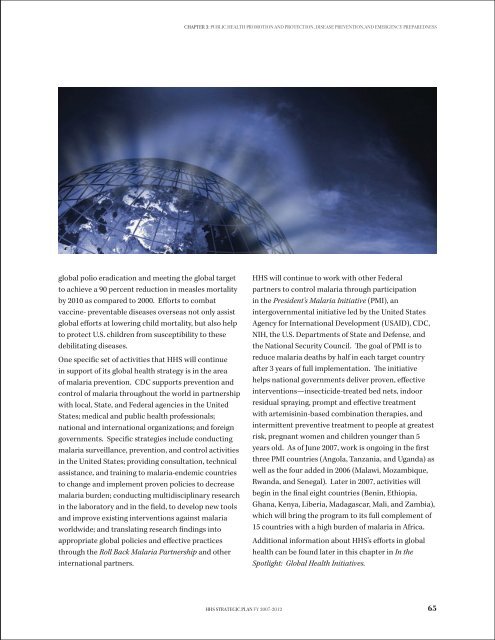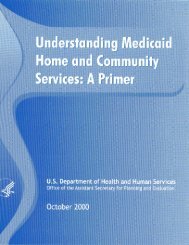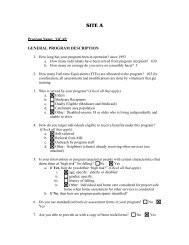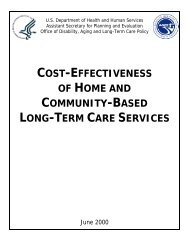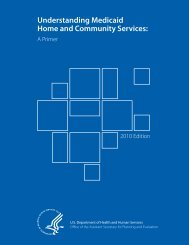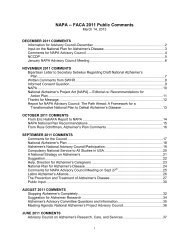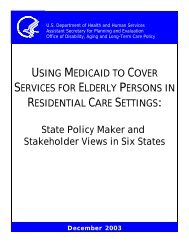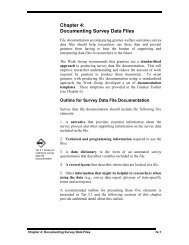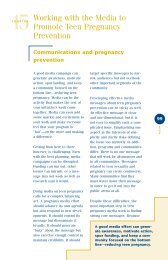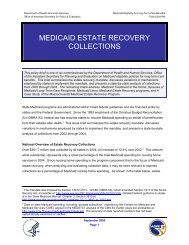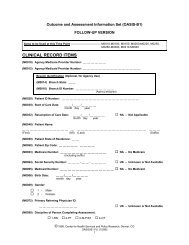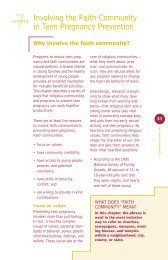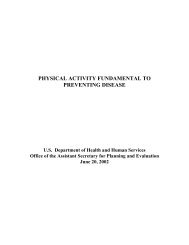CHAPTER 3: Public <strong>Health</strong> Promotion <strong>and</strong> Protection, Disease Prevention,<strong>and</strong> Emergency PreparednessZoonotic 7 /Vectorborne DiseasesTo address zoonotic <strong>and</strong> vectorborne diseases, HHSwill develop plans to respond to a disease outbreakthat encompasses animal, vector, <strong>and</strong> human expertsworking in synergy. CDC will develop diseasesurveillance systems that incorporate animal, vector,<strong>and</strong> human data to provide an effective public healthresponse that will mitigate the impact <strong>of</strong> a multispeciesoutbreak. CDC will develop, test, <strong>and</strong> deploy improvedmethods for the detection <strong>and</strong> control <strong>of</strong> insectborneviruses <strong>and</strong> bacteria <strong>and</strong> will improve the capacity todetect the intentional release <strong>of</strong> plague, Rabbit Fever(tularemia), <strong>and</strong> other agents with bioterror potential.FDA will foster the development <strong>of</strong> preventive vaccinesfor malaria, dengue fever, <strong>and</strong> other vector-borne<strong>and</strong> zoonotic diseases by working with industry <strong>and</strong>academia. In addition, surveillance, detection, <strong>and</strong>response systems will be developed <strong>and</strong> tested toaddress domestic <strong>and</strong> international epidemics <strong>of</strong>vectorborne pathogens with the potential to harm theU.S. population.Foodborne/Waterborne IllnessesTo combat foodborne illness, FDA <strong>and</strong> CDC willwork together to protect public health throughpreventive strategies that improve surveillance,inspection, tracking, detection, investigation,control, <strong>and</strong> prevention <strong>of</strong> foodborne outbreaks <strong>and</strong>disease; strengthen the enforcement <strong>of</strong> regulations;<strong>and</strong> broaden education about these problems. HHSwill improve the important national collaborativesurveillance <strong>and</strong> response networks <strong>of</strong> the FoodNet,PulseNet, <strong>and</strong> OutbreakNet to make them faster,more responsive, <strong>and</strong> capable <strong>of</strong> more detailedinvestigations. FDA <strong>and</strong> CDC, along with the U.S.<strong>Department</strong> <strong>of</strong> Agriculture, <strong>and</strong> other organizations,will continue to participate in the Council to ImproveFoodborne Outbreak Response, a group created todevelop tools that facilitate the investigation <strong>and</strong>control <strong>of</strong> foodborne disease outbreaks. Over thenext several years, the Council will develop multistate7 Zoonotic diseases are caused by infectious agents (such asmosquitoes) that can be transmitted between (or are shared by)animals <strong>and</strong> humans.outbreak guidelines, a repository for resources <strong>and</strong>tools, <strong>and</strong> performance indicators for the response toenteric disease.To address waterborne diseases, CDC will continue topartner with EPA to fill critical data gaps by providingimproved disease surveillance data, creating evidencebasedguidelines <strong>and</strong> training for investigations,exp<strong>and</strong>ing access to water-related information,collecting data to define the magnitude <strong>and</strong> burden<strong>of</strong> waterborne illness, evaluating water-relatedinterventions to improve public health, <strong>and</strong> developinglaboratory sampling <strong>and</strong> detection methodologies. Aspart <strong>of</strong> its preparedness effort, CDC will also develop,improve, <strong>and</strong> deploy rapid sampling <strong>and</strong> detectionmethods for potential waterborne threats. Providingcomprehensive public health protection to allcommunity users <strong>of</strong> water will create a more effectiveFederal response aimed at reducing the burden <strong>of</strong>waterborne disease in the United States.Global <strong>Health</strong>One key strategy for preventing the spread <strong>of</strong> infectiousdisease is preventing it from reaching the UnitedStates. HHS will collaborate with the World <strong>Health</strong>Organization (WHO) <strong>and</strong> other international partnersto provide epidemiologic <strong>and</strong> laboratory support toassist countries in addressing disease threats throughimproved disease detection. HHS also will provideprogrammatic expertise, training, <strong>and</strong> funding supportto assist with surveillance, control, elimination, <strong>and</strong>eradication activities for diseases such as measles,polio, avian influenza, <strong>and</strong> HIV/AIDS, as well as theprovision <strong>of</strong> technical assistance with safe <strong>and</strong> healthywater <strong>and</strong> improved sanitation.Immunization has revolutionized child health incountries throughout the world. WHO estimates thatalmost 40 percent <strong>of</strong> child deaths for children youngerthan 5 years <strong>of</strong> age are potentially preventable byvaccines. xxi HHS has been a major supporter <strong>of</strong> globalinitiatives to eradicate polio; control measles; <strong>and</strong>introduce new vaccines for pneumoccocal diseases,rotavirus, <strong>and</strong> possibly in the near future, malaria<strong>and</strong> even HIV. HHS remains committed to achieving64 HHS Strategic Plan FY 2007-2012
CHAPTER 3: Public <strong>Health</strong> Promotion <strong>and</strong> Protection, Disease Prevention,<strong>and</strong> Emergency Preparednessglobal polio eradication <strong>and</strong> meeting the global targetto achieve a 90 percent reduction in measles mortalityby 2010 as compared to 2000. Efforts to combatvaccine- preventable diseases overseas not only assistglobal efforts at lowering child mortality, but also helpto protect U.S. children from susceptibility to thesedebilitating diseases.One specific set <strong>of</strong> activities that HHS will continuein support <strong>of</strong> its global health strategy is in the area<strong>of</strong> malaria prevention. CDC supports prevention <strong>and</strong>control <strong>of</strong> malaria throughout the world in partnershipwith local, State, <strong>and</strong> Federal agencies in the UnitedStates; medical <strong>and</strong> public health pr<strong>of</strong>essionals;national <strong>and</strong> international organizations; <strong>and</strong> foreigngovernments. Specific strategies include conductingmalaria surveillance, prevention, <strong>and</strong> control activitiesin the United States; providing consultation, technicalassistance, <strong>and</strong> training to malaria-endemic countriesto change <strong>and</strong> implement proven policies to decreasemalaria burden; conducting multidisciplinary researchin the laboratory <strong>and</strong> in the field, to develop new tools<strong>and</strong> improve existing interventions against malariaworldwide; <strong>and</strong> translating research findings intoappropriate global policies <strong>and</strong> effective practicesthrough the Roll Back Malaria Partnership <strong>and</strong> otherinternational partners.HHS will continue to work with other Federalpartners to control malaria through participationin the President’s Malaria Initiative (PMI), anintergovernmental initiative led by the United StatesAgency for International Development (USAID), CDC,NIH, the U.S. <strong>Department</strong>s <strong>of</strong> State <strong>and</strong> Defense, <strong>and</strong>the National Security Council. The goal <strong>of</strong> PMI is toreduce malaria deaths by half in each target countryafter 3 years <strong>of</strong> full implementation. The initiativehelps national governments deliver proven, effectiveinterventions—insecticide-treated bed nets, indoorresidual spraying, prompt <strong>and</strong> effective treatmentwith artemisinin-based combination therapies, <strong>and</strong>intermittent preventive treatment to people at greatestrisk, pregnant women <strong>and</strong> children younger than 5years old. As <strong>of</strong> June 2007, work is ongoing in the firstthree PMI countries (Angola, Tanzania, <strong>and</strong> Ug<strong>and</strong>a) aswell as the four added in 2006 (Malawi, Mozambique,Rw<strong>and</strong>a, <strong>and</strong> Senegal). Later in 2007, activities willbegin in the final eight countries (Benin, Ethiopia,Ghana, Kenya, Liberia, Madagascar, Mali, <strong>and</strong> Zambia),which will bring the program to its full complement <strong>of</strong>15 countries with a high burden <strong>of</strong> malaria in Africa.Additional information about HHS’s efforts in globalhealth can be found later in this chapter in In theSpotlight: Global <strong>Health</strong> Initiatives.HHS Strategic Plan FY 2007-201265


